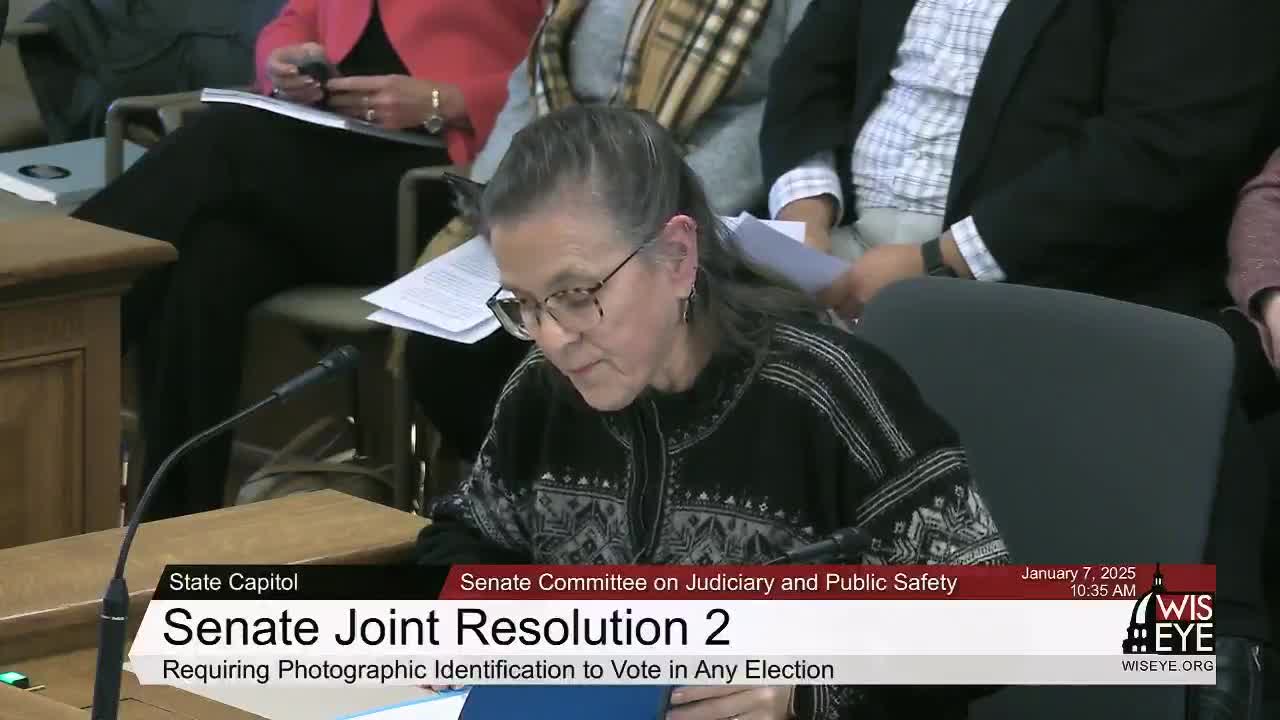Wisconsin lawmakers face backlash over proposed voter ID constitutional amendment
This article was created by AI summarizing key points discussed. AI makes mistakes, so for full details and context, please refer to the video of the full meeting. Please report any errors so we can fix them. Report an error »

The Senate Committee on Judiciary and Public Safety convened on January 7, 2025, to discuss significant issues surrounding voter ID laws in Wisconsin, particularly Senate Joint Resolution 2, which aims to enshrine photo voter ID requirements in the state constitution. The meeting featured testimony from various stakeholders, highlighting the potential implications of this resolution on voter access and participation.
Sam Lebold, representing the Brennan Center and All Voting is Local, expressed strong opposition to the resolution, arguing that it would exacerbate existing barriers to voting for marginalized communities, including people of color, the elderly, and individuals with disabilities. He emphasized that the current voter ID law disproportionately affects these groups, with an estimated 11% of eligible voters lacking the required identification. Lebold warned that embedding such restrictions in the constitution could permanently entrench these barriers, undermining the democratic process.
Lisa Hassenstab, the public policy manager for Disability Rights Wisconsin, echoed these concerns, detailing the challenges faced by voters with disabilities in obtaining photo IDs. She noted that many individuals with disabilities do not drive and face significant obstacles in accessing DMV services, including limited public transportation options and inadequate ADA compliance at DMV locations. Hassenstab highlighted that 14 counties in Wisconsin lack any form of public transportation, further complicating access to voting.
The discussions also touched on the broader context of voter participation in Wisconsin, with Lebold noting that the state experienced its highest voter turnout in 2024. He argued that instead of implementing restrictive measures, lawmakers should focus on improving access to the ballot, such as allowing absentee ballots to be processed earlier and ensuring that election administration remains impartial.
The committee's deliberations underscored a critical divide in Wisconsin politics regarding voting rights and access. As the state grapples with these issues, the testimonies presented at the meeting reflect a growing concern among advocates for equitable voting practices. The committee's decisions in the coming weeks will be pivotal in shaping the future of voter access in Wisconsin, with potential implications for the upcoming elections.
Sam Lebold, representing the Brennan Center and All Voting is Local, expressed strong opposition to the resolution, arguing that it would exacerbate existing barriers to voting for marginalized communities, including people of color, the elderly, and individuals with disabilities. He emphasized that the current voter ID law disproportionately affects these groups, with an estimated 11% of eligible voters lacking the required identification. Lebold warned that embedding such restrictions in the constitution could permanently entrench these barriers, undermining the democratic process.
Lisa Hassenstab, the public policy manager for Disability Rights Wisconsin, echoed these concerns, detailing the challenges faced by voters with disabilities in obtaining photo IDs. She noted that many individuals with disabilities do not drive and face significant obstacles in accessing DMV services, including limited public transportation options and inadequate ADA compliance at DMV locations. Hassenstab highlighted that 14 counties in Wisconsin lack any form of public transportation, further complicating access to voting.
The discussions also touched on the broader context of voter participation in Wisconsin, with Lebold noting that the state experienced its highest voter turnout in 2024. He argued that instead of implementing restrictive measures, lawmakers should focus on improving access to the ballot, such as allowing absentee ballots to be processed earlier and ensuring that election administration remains impartial.
The committee's deliberations underscored a critical divide in Wisconsin politics regarding voting rights and access. As the state grapples with these issues, the testimonies presented at the meeting reflect a growing concern among advocates for equitable voting practices. The committee's decisions in the coming weeks will be pivotal in shaping the future of voter access in Wisconsin, with potential implications for the upcoming elections.
View full meeting
This article is based on a recent meeting—watch the full video and explore the complete transcript for deeper insights into the discussion.
View full meeting